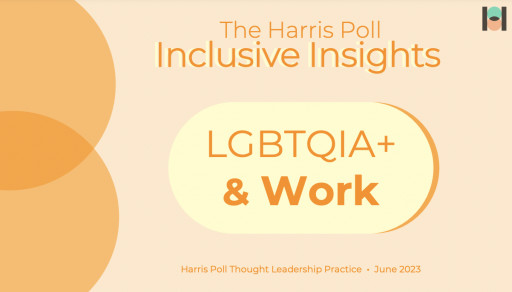NEW YORK, June 15, 2023 (Newswire.com) - June is Pride Month, a time when lesbian, gay, bisexual, transgender, queer, intersex, and asexual people celebrate their culture and their efforts to gain equal rights in society. However, a new survey and report this month from The Harris Poll Thought Leadership and Futures Practice finds that the country's LGBTQIA+ employees still fear prejudice - while most say their workplaces are headed in the right direction, most of the workers themselves are not yet "out," fearing reprisals or career hurdles.
The findings come in "Inclusive Insights: LGBTQIA+ and Work," which is based on an online study by The Harris Poll conducted between May 26 and June 1, 2023, of a 1,110 sample of LGBTQIA+ adults aged 18 and over in the United States.
"As the nation celebrates Pride Month, our research found that people in the LGBTQIA+ community do feel they have reason to celebrate, with most feeling that their employers are taking steps to support them personally and professionally," said Tim Osiecki, Senior Research Manager at The Harris Poll Thought Leadership and Futures Practice. "However, it also shows that most people in the community still don't feel comfortable in the workplace to truly be themselves, and that those issues are even more prevalent among certain groups."
The survey found that just four in 10 (41%) of queer employees are out to their coworkers, and even fewer (37%) are out to their supervisors or on professional-oriented social media like LinkedIn (31%).
The survey allowed respondents to cite multiple reasons for that choice, and the most common reasons they cited for their caution were personal preference (52%) or having other priorities (37%). But one in three LGBTQIA+ employees (33%) said they were "concerned about negative reactions from coworkers," nearly one in four (33%) said they were "concerned it could damage my career" and one in six (16%) said, "my company doesn't provide a safe environment" for coming out.
More than eight in 10 (81%) agree with the statement "My company is moving in the right direction when it comes to LGBTQIA+ inclusion," and seven in 10 (71%) say, "I believe that my place of employment would hold people accountable for anti-LGBTQIA+ behavior (or I have already seen it do so in the past)."
The survey also assessed what LGBTQIA+ people believe makes a workplace supportive and safe. Safeguards addressing discrimination and harassment were more valued than any other policy, benefit, or resource, respondents said, with the top two answers being "safe reporting channels for incidents of LGBTQIA+ discrimination and harassment" (89%) and "written disciplinary protocol address incidents of LGBTQIA+ discrimination and harassment" (86%).
Having those policies in place matters, respondents indicated. Nearly four in 10 (38%) of LGBTQIA+ employees have reported harassment or discrimination related to their identity, but their employer failed to act. Nearly half (46%) have experienced harassment or discrimination but chose not to report it because it felt either unsafe or unproductive to do so.
The survey indicates that creating an inclusive, safe, and supportive environment where LGBTQIA+ employees can come out appears to have benefits for those employees and, by extension, their employers.
"Out LGBTQIA+ employees report a more positive and thriving employee experience," the report said, pointing to significant differences between employees who were out at work and those who have not described their feelings about the workplace. For example:
- 69% of "out" workers reported feeling "confident" compared to 53% of those not out.
- 64% of "out" workers said they felt "connected to coworkers" compared to 43% of those not out.
- 65% of "out" workers said they felt "purposeful" compared to 54% of those not out.
- 61% of "out" workers said they felt "invested in company success" compared to 47% of those not out.
A common theme across almost all questions was that transgender people experience more workplace difficulties than other people in the LGBTQIA+ community.
A greater percentage of transgender people said they had reported harassment or discrimination with no action from their employer (57%) and that they chose not to report it because it might be unsafe or unproductive to do so (65%).
In addition, more than six in 10 (62%) transgender respondents have had a negative experience coming out at work (such as coworkers treating them negatively, feeling emotional trauma, or experiencing negative professional consequences, etc.). Nearly half (47%) of all LGBTQIA+ employees, 52% who identify as lesbian and 50% who are gay, reported sharing the same sentiment.
People who describe themselves as being LGBTQIA+ and of traditional racial or ethnic minority groups also reported more frequent negative workplace experiences.
Finally, as Pride Month continues, the survey indicates that organizations should think hard about how they celebrate it.
"Queer employees seek genuine, whole-hearted Pride Month efforts from their employers," the report said, noting that while 57% of LGBTQIA+ employees report their company recognizes Pride Month in some way, 62% "think it's worse to make a halfhearted Pride Month effort than do nothing at all."
What does a good Pride Month effort look like? Survey respondents said companies should put their money and public efforts where their words are: The most common recognition is a company-wide email, but what respondents said would be best is donations to LGBTQIA+ causes, with organizing volunteer activities and physical displays of banners and flags as close seconds.
"Inclusive Insights: LGBTQIA+ and Work," from The Harris Poll Thought Leadership and Futures Practice, is based on a survey that was conducted online within the United States by The Harris Poll between May 26 and June 1, 2023, among 1,110 LGBTQIA+ adults aged 18 and over. The body of research includes 309 respondents who identify as lesbian, 346 who identify as gay, 380 as bisexual, 94 as transgender, as well 79 who identify as non-binary. Moreover, this survey includes 382 who identify both as LGBTQIA+ and as BIPOC. The report is based on a sample of 696 respondents who are currently employed.
To learn more about The Harris Poll Thought Leadership and Futures Practice and "LGBTQIA+ and Work," read the study or subscribe to the newsletter.
About The Harris Poll Thought Leadership and Futures Practice
Founded in 1956, The Harris Poll is one of the longest running surveys in the U.S. tracking public opinion, motivations, and social sentiments. Every year, we poll millions of people on the trends that are shaping our modern world. Building on 50+ years of experience pulsing societal opinion, we design research that is credible, creative, and culturally relevant. Our practice drives thought leadership and unearths trends for today's biggest brands. We are focused on helping our clients get ahead of what's next.
Contact Information:Madeleine Moench
[email protected]
Original Source: As Pride Month Continues, New Survey Finds Workplaces Can Be Proud - But Still Have Work to Do




